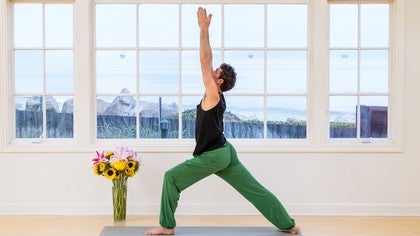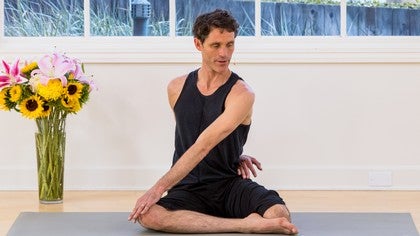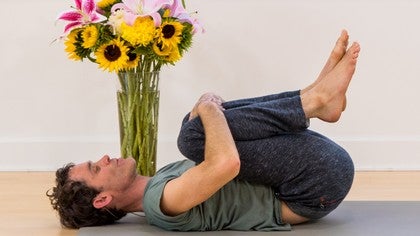Description
About This Video
Transcript
Read Full Transcript
We're gonna do a practice that's for when you finished traveling. You've arrived and maybe you're in an entirely different time zone or a time zone that's eight hours or 12 hours or 14 hours different than where you started. And so when you get to a new place, from ayurvedic perspective, it's really important to just adopt the time of the place you're in and since most of time you're gonna be having at least two to three hours if not 12 hours before everybody else, wherever you are is going to sleep, I recommend this kind of practice which is mildly stimulating but it also has some grounding elements. It has some things to sort of relieve tension from the hips, relieve tension from the internal organs so that your digestion and your circulation really come back in line. And what I recommend that's not in the video is that when I finish or when we finish, that you take a long walk.
You might even walk yourself to a sauna. Or to a bath house or somewhere where you can then engage in the wondrous process of really deep, warm, healing waters and bathing. Because that's another great way to spend time acclimating to a new environment. Drink plenty of water too 'cause that's often one of the things that will make it difficult for people to acclimate is getting dehydrated. So here we go.
We're gonna start with just some basic sun salutes. So come to the front of your mat with your feet together. If you prefer to have them spaced hip width, that's fine too. I like it together. And then wake your toes up and just for a moment bring your hands to your heart.
Take a moment to really acknowledge where you arrived. That you're here now and you're going to enter the time and the flow of the place that you're in. With your next exhalation, let out an ujjayi breath exhalation. And inhale into utkatasana. Bending your knees, bending at your hips.
Grounding in your feet. As you exhale, the hands come straight down the mid line as you fold forward. If you need to, keep your knees bent, if not you can straighten the legs and come into uttanasana at the end of your exhalation. And then inhale. Lift your chest and step your left foot back.
Bring your hands back as you finish your exhale and then inhale your arms up. Coming into warrior one with your front knee bent your back leg straight and your chest and shoulders square to the front leg. Exhale down. Nice, patient exhale. Stepping back and moving through either a knees, chest and chin vinyasa into cobra.
Or you can do chaturanga into up dog. And then you're gonna exhale back to down dog. And then this time, as you finish your exhalation, step your left foot forward, bring your hands back and inhale your arms up. Exhaling down. Gonna go all the way through to whichever position you're doing next.
Either cobra or up dog on that exhale. And then by taking an inhale here in up dog, you get to spend some time. Exhale back to down dog. And then bring your right foot forward again, left heel down. Finish your exhale with your arms back.
Swing your arms out to the side as you come up. Back leg straight, front knee bent. Exhale, hands down the center line. Ground your hands as you step your right foot back all the way through into chaturanga cobra or chaturanga up dog. You inhale there.
Exhale back to down dog. I've demonstrated doing a dip. If you wanna do an extra dip there, you can. Or you can just go straight into down dog. And then left foot again.
Exhale completely as your hands come back and then inhale up. Exhaling down. Nice long smooth breaths. Feeling the graceful rhythm of your body. Inhaling up dog and spread your toes.
Then ground with your hands and your forearms and then come back to downward facing dog. Gonna take about five breaths here. So as you let that first exhale out, don't get too ambitious about stretching your shoulders. Begin by first grounding your hands and feet. Really waking up your fingers and toes.
Inhaling here. Charge your arms and your legs. Feeling your arm, the power in your arms and your legs the grounding of your hands and feet. And then exhale and notice if there's any tension to release in your neck. Notice how you feel in your spine.
Reach with your heels. And then inhale again into your arms and your legs. As you inhale, feel the power of your limbs. As you exhale, relax through your neck, the core of your body. Maintaining the grounding you created in your arms and legs with the inhale.
Two more like that. The end of this next exhalation, you're gonna step or hop lightly forward. I actually recommend hopping because it's good for waking you up. Exhale and fold into uttanasana. And then inhale come back to utkatasana, the chair.
Exhale standing. This next position is actually a variation of arti chandrasana. It's a standing side bend. So as you come into it, place your right foot in front of your left and really press your right shin into your left as you bring your arms out to the side with your fingers sort of draped downward, your wrist is bent. And then with an inhalation, you're gonna bring your hands toward each other of about the height of your naval and your left hand will go across at the height of the naval.
The right hand comes up over the right ear and you look down over your left shoulder. Into a gentle side bend. And you really wanna feel the grounding in your standing leg. Which in this case is your left. Inhale back to center.
Pull into finish that inhale. And exhale and bend the other way. And then inhale as you come up with the next inhale step your right foot out then bring your left foot across. Balance things out here with an exhale. Really get yourself grounded and balanced.
Inhale your hands in together. And now the right hand comes across at the naval left hand over the left ear, gaze over the right shoulder. And then inhale back to center. Pull in to finish that breath. And exhale, bend the other way.
See how I'm turning the bottom fingers up and the top fingers down. That little rotation in the arms is important. With the next inhale now step your left foot out. Cross your right shin in front of our left so that you're on the ball of the right foot. As you exhale, relax your shoulders, balance the weight of your head over your shoulders and your standing leg.
And then inhale, we'll do one more complete round of this. These side bending actions are really really great for helping to stimulate the colon gently so that you'll be sure to be regular. Many many people become irregular in terms of their bowel movements when they travel. And so side bending is one of the best ways to gently promote the peristalsis in your large intestine. And then inhale, step with your right foot.
Then the left foot comes in front. Hands come in at the top of the inhale. Right hand goes low. Left hand high, look over that right shoulder. Inhale, come back to center.
Pull in. And then exhale again. Feel the rotation of your arms. Feel the finger tips. Feel the gentle stretching through the side waist and ribs.
And then as you come back to center, step your feet together. Bring your hands down and come to tadasana. This next one is a twisting chair. We're gonna do it for just a few breaths on each side. This is also another part of really working with setting up the G.I. tract, the large intestine for being as balanced and functional as possible when you've just arrived somewhere.
So inhale, arms up above your head. And as you wave down, we're gonna do this in a kind of continuous way. So as you come down, you're gonna twist towards your right knee. Bring your left elbow to the outside of your right knee. Hands in prayer position.
Gaze down towards your toes. Inhale here. Try to keep your knees together, don't let the left knee squirt forward. Exhale, swing your hands down in front of your toes. Your arms are straight.
And then inhale up. And again, as you come down, you're gonna twist, bend your knees, bend your hips all at once. Keep the weight balanced on your feet. Keep that right knee from coming forward and place your hands in a prayer position. Inhale here.
Position your body in whatever way allows your breath to drop down, and as you exhale, lower your hands down in front of your toes and inhale up. Do this two more times. This is a way of literally squeezing, wringing out, pumping all the circulation through your organs of digestion and elimination. Exhale down, inhaling the twist. Exhale down.
Inhale up. Exhale down, to the other side. Try to move as rhythmically as you can. Inhale. Exhale.
Inhale. And then exhale, your hands come down. With the next breath, we're gonna go into the uttanasana, the standing forward bend. So one more time, inhale up. And as you exhale, your hands come down, be sure to bend your knees if you need to.
Fold over. As you come in, you can bring your forehead in towards your shins. Take one breath there. I'm gonna turn on the mat. And then what you're gonna do is you're gonna step your left foot back and drop it down and bring your right knee in front of your left knee and setting up for what are called, often called gomukhasana.
There's two variations I'm gonna teach you. The first one, you really tuck your shins in together so they're touching. And then you start to walk yourself back slowly but surely so that your shins are getting squeezed. And so this can be really really excellent for getting the stagnation out of the calves and the feet. And helping to really pump out any stagnation of the fluid circulation, the lymph circulation as well as to open up any tension in your hips.
So once you arrive in this shape, you can place your finger tips down on the ground to help you balance. And as you come into this, the action is really to try to be neutral in the spine so you align your spine up over your hips and then relax your legs so your body actually, it's sort of like rolfing your legs with your own body weight. It really helps to squeeze out any tension, lactic acid from the muscles that can build up when you're traveling. If this feels too intense to sit in it, what I recommend that you do is you bring yourself forward a little bit and you sort of ease your way into it. You may find that you're feeling very tight or there's an intense stretch somewhere along the way.
And the good thing about it is, you can always use your hands to adjust just how intense the sensation is of getting the weight of the body down on the legs. So let's take two breaths here. As you inhale, feel your breath down into your belly and actually ground through your knees. That helps you to release tension from the front of the hips as well. Long exhalation.
And then coming forward with the next inhale. You're literally just gonna side the other leg around in front. You cinch the chin bones together. The feet are both pointing backwards. And then you start moving into the shape.
And again, be gentle. This one can be a lot more intense than you think it is. And so it's good to just give your calves and your legs a gentle bit of pressure and massage in the position. And then if you choose to, you can be upright in the shape with your fingers balancing you. And let's take a few breaths here.
Each time you exhale, completely relax through your shoulders. And then coming forward. You're gonna walk yourself out. And this time, you're gonna widen your feet so you don't change anything with the knees, you just widen the feet into this variation. And again, you may find that this creates a really intense stretch.
And if so, you'll just bolster yourself up on a blanket or a block. But getting something underneath your hips will help you to feel more comfortable and that the shape is doable for you. If it's not, then what I recommend you do is you just simply, you simply sit cross legged. And then, so you're having roughly, the knees are stacked. And the feet are facing opposite directions.
I'm gonna take a hold of my big toes with my hands. And then again I'm gonna, with an inhalation sit up straight, and with our exhalation, we'll fold forward for a few breaths. So draw deep ujjayi inhale. Exhale coming forward. Inhale here.
You can rest your chin on your knee. You can turn your head to one side. Position in whatever way is the most natural for your neck. Take one more breath here. Exhaling here.
Relax through your shoulders and your back. And now we're gonna inhale up and the counter poses is we're gonna do something called purvottanasana. Which is the reverse plank. So you place your finger tips back down roughly in line with your tail bone. And then you start to point your toes.
And what's nice to do with this one is, you're gonna reach with your toes and then you start to lift the hips up. And eventually the head can come back and you're in this shape like that. This one's really great for turning on all those back muscles that tend to get stagnant when you're traveling all day. Then you're gonna stack your right knee on top of your left. Come forward so the knees are roughly on top of each other.
Or you're in that cross legged variation. Or you're up on a bolster or a blanket here to make sure that you're getting the, an appropriate doable amount of stretch and it's not overwhelmingly intense. And then with an exhalation, take a hold of your big toes and feel yourself ground into your sit bone. So your whole spine sits up. Your shoulders relaxed.
Draw one more ujjayi inhale here. Feel the sensation of the breath down into your belly and your pelvis. And as you exhale, fold forward. Nice and slow. As you arrive, again positioning your chin wherever it works for you.
Inhaling deep into your low abdomen and your hips. As you exhale, relax your shoulders and actually allow your elbows to soften down towards your body. Inhaling. Draw your breath all the way down into your pelvis. Try to make those sensations on the inside rather than just the sensations of stretching.
Exhaling here. One more, inhale. One more exhale. Then inhaling, lift yourself back up. Stretch your legs out in front of you.
Finger tips in line with your tail bone or maybe just a little further back. Draw your elbows in line with your wrist. Then again reach with your toes. And straight in through the arms, and as you lift your hips up, keep your shoulders broad. Don't let your shoulders pinch together.
Instead, roll your arms forward 'cause this is what helps you to ground your legs and really find yourself in this pose with your whole body working. And then come on down. As you come on down, you're gonna turn yourself so that you come into a lying twist. Great, so as you arrive here, what I'd like you to do is you're gonna take your hands on your knees then inhale and lift your arms up and what we're gonna do is we're gonna spend three breaths rolling down, very slowly. And so this is obviously something that's gonna engage your abdomen muscles.
It's gonna work with the whole core of the body too. Which is so important to feeling grounded and stable. As you arrive to where you are. As soon as you lie down on the ground, become aware of the soles of your feet on the ground. And let's let out a deep sighing exhale here.
'Cause this might be the first time you've lied down since you arrived wherever you've gotten to. So deep inhale. And exhale out your mouth with a sigh. Do that a couple more times. And as you inhale, become aware of wherever it is you really need to let go from.
And as you exhale, relax and soften that area. One more. Then draw your knees into your chest. You can interlace your fingers over your shins. And as you exhale, crawl your chin into your chest and then your knees back into your cheek bones.
As you inhale, lie back down. And you're gonna twist your knees off to your left side. Knees go off to the left, your right arm turns down on the ground, straight out from your shoulders. And as you arrive here now, exhale and gently engage through your ankles. That'll help you to ground through your legs.
It also helps your low spine to release. If you feel more like you need to do a forward bend, you can pull your knees closer to your chest. If you feel more comfortable in more of a back bending kind of twist, push the knees down away from the body more and it'll make more of an arch in the low back. I'm gonna go kind of in the middle here. Then really turn your head and ground through the palm of your right hand.
Left palm rest on your knees. And we'll just take a few long breaths here now. Go for a feeling that you're like a humming bird who is using its proboscis to probe the nectar from a flower. So you're gonna draw the breath down into the core of your body down into your spine in a way where you notice where the body needs to open up. Inhale breath to that area, and then with your exhalation, relax.
And create space in that area. Last exhalation, completely relax your shoulders. And then inhaling your knees back to center. Interlace your fingers onto your shins. And exhale, curl up.
Knees into the cheeks. Inhaling as you lie back. Place your head down, then your knees go off to the left. Or your knees go off to the right, excuse me. You'll turn your head over to your left.
Ground through the palm of your left hand. Position your knees wherever it's the most comfortable for you to twist. And gently engage your toes and your ankles so that your legs engage. And we'll do a few breaths just like we did on the other side here. Relax between your shoulder blades on the exhalation.
Pause at the end of the exhalation so you feel the stillness at the end of the exhale. Inhale down into your belly. Exhaling relaxing shoulders. Turning your head over towards your left hand. Grounding your left hand.
Peace in your spine. Inhale down. Exhaling one more. As you come back out of this twist, bring your knees into your chest. Interlace your fingers on your shins as you inhale.
Exhale, curl your chin into your chest and bring your knees back into your cheek bones. And then inhale, lie yourself back down. Stretch your legs out. And set up for shavasana. As you come into shavasana, the last thing that we want you to do is take a three hour shavasana and miss your chance at aligning your bio rhythms with the time zone you have arrived in.
And so we're gonna do a five breath shavasana. And then in this way, you're reminding your system to relax. But you're not gonna drop away into sleep. And so what I invite you to do is actually notice your body, wherever you might need extra healing, extra relaxation. You can place your hands wherever it feels the best to do so.
And as you find the right spot, we're gonna draw a deep inhalation. And with your exhalation, you're gonna relax. You can close your eyes, let out a sighing sound. Just really deeply release the whole body into the support of the ground. And then do it four more times.
Inhaling awareness of your body. Bringing special awareness to those places that you put your hands. Exhaling, relaxing, soothing, balancing those areas. Balancing your whole body. Keep going like this.
Feel your eyes completely relaxed. Your jaws completely relaxed. Your neck and shoulders. One more like that. It's short, but sweet.
But I've used this many many times in places I've traveled to and it's my opinion that it actually works much better to do a short, concentrated relaxation than to draw things out and nap. Then you're gonna roll yourself over onto your right side. You can place your left hand in front of your chest. Take a moment there to relax. And then with your next inhale, push in to your left hand, keep your gaze down toward the floor and your head comes up with your body.
And then bring yourself into a seated position. Lotus is a really excellent post-travel position because it's so grounding and brings the vata energy, the nervous system energy into a center point. And bring your hands to your heart. Namaste.
Prana: Robert Svoboda & Scott Blossom
Comments
You need to be a subscriber to post a comment.
Please Log In or Create an Account to start your free trial.








